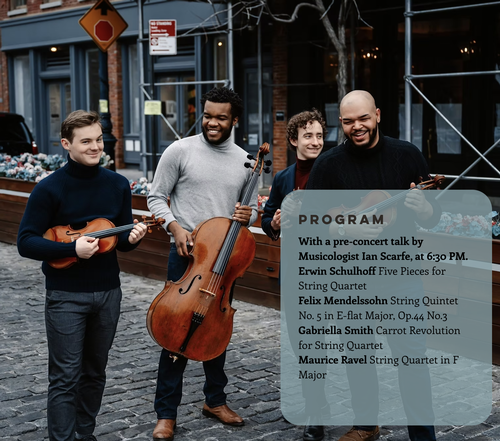Chamber Music Monterey Bay 58th Season - Isidore String Quartet
Name:
Chamber Music Monterey Bay 58th Season - Isidore String Quartet
Date:
January 11, 2025
Time:
7:30 PM - 9:30 PM PST

Event Description:
In the second concert of its 58th season, Chamber Music Monterey Bay presents the acclaimed Isidore String Quartet in a program comprising two masterworks and two lesser-known but no less enthralling compositions. The quartet, which formed just five years ago, won the prestigious Banff International String Quartet Competition in 2022 and received an Avery Fisher Career Grant in 2023.
The program begins with the Five Pieces for String Quartet (1923) by Erwin Schulhoff (1894–1942). Schulhoff, born in Prague, was one of the most gifted of a lost generation of composers who died in Nazi concentration camps. Antonín Dvořák encouraged his early music training. Schulhoff survived combat in WWI and emerged as a visionary composer interested in modern musical trends of his day. This early string quartet explores five dance forms in exuberant and amusing ways. The second work of the evening is the magnificent String Quartet in E-flat Major, op. 44 no. 3 (1838) of Felix Mendelssohn (1809–47). It was written during a happy time in Mendelssohn’s life: he was at the peak of his success as a composer and conductor and was about to welcome his first child. The three opus 44 string quartets were his only major compositions in 1838, and Mendelssohn regarded the E-flat quartet as the greatest of the three.
Following intermission, the quartet will perform Carrot Revolution (2015) by Gabriella Smith (b. 1991). The Berkeley-born Smith composed this work in 2015 for a special exhibition at the Barnes Foundation in Philadelphia. The piece celebrates the spirit of fresh observation and new ways of looking at old things—a virtuoso amalgamation of contrasting influences, including Bach, Bartók, Gregorian chant, Joni Mitchell, Paul Simon, bluegrass, and more. The concluding work is the String Quartet in F Major (1902–3) by Maurice Ravel (1875–1937). Ravel was 28 when he wrote this masterpiece, destined to become one of the most popular of all string quartets. Major influences were Javanese music and the earlier quartets of César Franck and Claude Debussy. While Ravel’s quartet was generally well received, some critics called for major revisions. Debussy advised the younger composer, “In the name of the gods of music, and in mine, do not touch a single note of what you have written in your quartet.”
The concert will be preceded by a 30-minute presentation by expert musicologist Ian Scarfe. The talk begins at 6:30 and will provide attendees deeper insight into the evening’s program.
The program begins with the Five Pieces for String Quartet (1923) by Erwin Schulhoff (1894–1942). Schulhoff, born in Prague, was one of the most gifted of a lost generation of composers who died in Nazi concentration camps. Antonín Dvořák encouraged his early music training. Schulhoff survived combat in WWI and emerged as a visionary composer interested in modern musical trends of his day. This early string quartet explores five dance forms in exuberant and amusing ways. The second work of the evening is the magnificent String Quartet in E-flat Major, op. 44 no. 3 (1838) of Felix Mendelssohn (1809–47). It was written during a happy time in Mendelssohn’s life: he was at the peak of his success as a composer and conductor and was about to welcome his first child. The three opus 44 string quartets were his only major compositions in 1838, and Mendelssohn regarded the E-flat quartet as the greatest of the three.
Following intermission, the quartet will perform Carrot Revolution (2015) by Gabriella Smith (b. 1991). The Berkeley-born Smith composed this work in 2015 for a special exhibition at the Barnes Foundation in Philadelphia. The piece celebrates the spirit of fresh observation and new ways of looking at old things—a virtuoso amalgamation of contrasting influences, including Bach, Bartók, Gregorian chant, Joni Mitchell, Paul Simon, bluegrass, and more. The concluding work is the String Quartet in F Major (1902–3) by Maurice Ravel (1875–1937). Ravel was 28 when he wrote this masterpiece, destined to become one of the most popular of all string quartets. Major influences were Javanese music and the earlier quartets of César Franck and Claude Debussy. While Ravel’s quartet was generally well received, some critics called for major revisions. Debussy advised the younger composer, “In the name of the gods of music, and in mine, do not touch a single note of what you have written in your quartet.”
The concert will be preceded by a 30-minute presentation by expert musicologist Ian Scarfe. The talk begins at 6:30 and will provide attendees deeper insight into the evening’s program.
